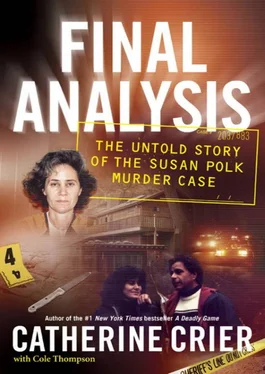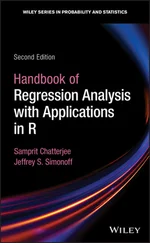Recalling Felix and Susan’s dramatic accusations of molestation against their sons’ day care providers, Gabe claimed that it was Susan who had convinced his father and brothers that he and Adam were victims of a satanic sex cult. Gabe went on to say that he now believed that his mother had “brainwashed” him against his father and described her as “full-blown delusional.” During his testimony, he recalled how she would sit at the breakfast table, scanning the newspaper for hidden codes and messages sent to her husband from the Mossad. She later elaborated on this, saying that this was how Felix communicated with undercover operatives. Gabe had no reason to doubt his mother’s claims; he simply went along with what she was saying. It was easier to agree than to debate what she was telling him.
During the courtroom proceedings, Gabe seemed distant, wearing an inscrutable stare as he sat in the witness chair or raised his eyes to the ceiling when contemplating answers to the prosecutor’s questions. Throughout the morning, Gabe used the word “delusion” countless times to describe his mother’s behavior. He recalled a car ride with Susan six months prior to the homicide during which she began speaking of ways to kill Felix. “She talked about drugging him and drowning him in the pool, hitting him over the head and drowning him in the pool, running him over with the car, or tampering with his car.”
Mentioning that she had been making threats for almost five years, Gabriel was accustomed to Susan’s emotional outbursts and, at some point, stopped taking her seriously. “She talked about killing him every day,” he said.
Still, Gabe said he was alarmed when she announced in September 2002 that she intended to leave him with Felix while she traveled to Montana to look for a place to live. He told the court that he found it odd that she would leave him with the man she deemed a monster, but after spending several days with Felix, Gabriel began rethinking his feelings about his dad. He was both surprised and pleased to find that Felix wasn’t the ogre that Susan had portrayed.
“Dad’s not such a bad guy,” Gabe told Susan during one call, recalling that his mother was “furious” about the divorce proceedings.
One week before the murder, Gabe said he warned his father that “he feared for his [dad’s] life” because of “all the things that his mother was saying.”
In response to questions from the prosecutor, Gabe said that he never witnessed any physical abuse in the home. “The most I’ve ever seen my dad do to my mother was slap her once,” he said. “About six months before the murder, I saw my mom slap my dad and police came out to arrest her.”
“Objection!” Susan bellowed, voicing opposition to her son’s use of the word “murder.”
Judge Brady sustained that objection, as well as Susan’s second protest over the word “killing.” Susan argued that Felix’s death should be referred to as “the incident.” But the judge disagreed, and substituted “homicide” as an acceptable alternative.
When Sequeira continued his direct examination, Gabe was asked to speak about his parents’ relationship. Here, Gabriel’s testimony corroborated Sequeira’s opening statements, portraying Felix as the dutiful working husband and Susan as the aggressor who would get in his face within minutes of his return home. Susan often degraded her husband, calling him “old” and “decrepit,” and making sexually explicit comments, including derogatory remarks about the size of his penis.
After Gabriel answered questions about the events of October 13 leading up to his gruesome discovery, the judge adjourned the proceedings for lunch and directed the defendant to begin her cross-examination when they returned. It had been a difficult morning for Susan, who spent much of Gabriel’s testimony quietly weeping in her seat. Listening to her son vilify her was hard, but she left the court vowing to return with renewed composure and determined to get Gabriel to admit that his father had been a tyrant.
Questioning Gabriel proved to be an arduous process, one that lasted for five grueling days. During that time, Susan challenged his recollections about his childhood, suggested he was hiding things when he couldn’t remember any abuse, and elicited facts about his early brushes with the law. She asked innumerable questions about the relationship between Felix and herself and probed her son’s affection for his brothers. She repeatedly broke down in tears when their memories differed and when he wouldn’t corroborate her claims of spousal abuse.
Early on, Susan questioned Gabe about the alleged ritualistic sexual abuse of Adam at the day care center in an attempt to demonstrate that the accusations came from Felix, not from her. Over Sequeira’s objections, Susan played a tape of Felix’s speech at the Berkeley Conference of the California Consortium of Child Abuse in 1988. It was at this event that he was introduced as a “parent of a ritualistically abused child.”
Gabe sat impassively as his dead father’s voice filled the courtroom. “The children were raped on stage, raped in every form imaginable,” Felix told conference participants. Meanwhile jurors were transfixed by the audio-taped lecture in which Felix claimed that his eldest son, Adam, had witnessed a baby being stuffed into a plastic bag and “hammered to death,” and that cult members ate flesh, vomit, and blood in front of his son and other children.
“My rage is omnipresent… my fantasy, of course, is to kill them,” Felix’s recorded voice resounded over speakers in the courtroom. “And I’m a rather moral person. I want to kill them.”
“Did you recognize your father’s voice?” Susan asked Gabe when the tape ended.
Gabriel responded affirmatively.
Afterward, Susan asked about allegations that he, too, had been sexually abused while in day care and that both his parents had gone to police to file a complaint. Still, he insisted that he and Adam had no recollection of being molested while in day care. He maintained that Susan was the one who had created the whole scenario and ultimately convinced Felix that it was real.
“Did it ever occur to you that he might be making it all up?” Susan asked.
“I don’t know,” Gabe replied.
While the questions were exhaustive, Susan never really probed Gabe’s recollection of the night he found his father’s body in the guesthouse. After three days of cross-examination, she asked the teen, “On the night you found your father’s body, were you scared?”
“I wasn’t scared, I was completely devastated,” Gabe replied. “But I wasn’t scared.”
Questions like this made it clear that Susan’s examination was going nowhere. She asked her son if he was “completely truthful” with police during his interrogation, and if he recalled how many times he told officers that his mother “had never been violent” with his dad. But she failed to delve further into the events of that day.
Instead, she pushed Gabe to portray his father in a negative light.
“You don’t recall your father poisoning Tuffy, the family dog?” she asked.
“No, I don’t.”
“Are you aware that your father woke up every day thinking about killing people?”
At times, Susan seemed determined to engage her son in a dialogue, invoking Judge Brady to issue a warning that cross-examination “is not a conversation.”
Even the prosecutor expressed frustration after it became clear that Susan intended to question his star witness until she was content with his responses—no matter the relevance to the case.
There was a break in the case during the second day of testimony when Susan arrived for court and told the judge that she had a bad sore throat, vowed that she “wasn’t making it up” and asked for a postponement. The judge acquiesced and instructed everyone to return to court the following Monday, March 13.
Читать дальше











